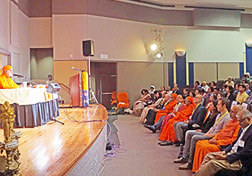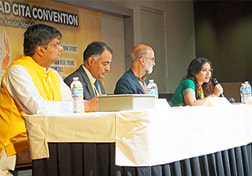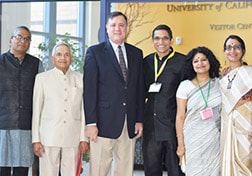
BY DEVIKA C.MEHTA
IRVINE, CA - In an era when the common man is regularly caught in a tiff between consciousness and morality, the Srimad Bhagavad Gita comes to the rescue for many. Apart from Hindus and a few others, its vast treasures have remained largely unknown.The Global Bhagavad Gita Conference 2017, envisioned by...
IRVINE, CA - In an era when the common man is regularly caught in a tiff between consciousness and morality, the Srimad Bhagavad Gita comes to the rescue for many. Apart from Hindus and a few others, its vast treasures have remained largely unknown.The Global Bhagavad Gita Conference 2017, envisioned by...
Swami Bhoomananda Thirtha, was turned into a reality by the Center of Inner Resources Development, North America, California Chapter on Sept 9 and 10 at the University of California, Irvine. In America, CIRD-NA also has chapters in Virginia and globally, has centers in Delhi, Jamshedpur and Malaysia.
Assembled at the Cluster Clove Auditorium in UCI were eminent Gita scholars and proponents from India and the US to deliberate on the Gita’s teachings and delineate fundamental psychological laws that govern the development of human character. Presided by Dr. Ravi Jandhyala, the conference was co-convened by Prof. Christopher Chapple of Loyola Marymount University, Dr. Satinder Dhiman, Associate Dean of MBA program of Woodbury University and Dr. Pankaj Bhatia, President of CIRD-NA Global Director of the World Resources Institute in Washington.
The conference interactively explored how the Gita appeals and applies to everyday life. Brilliant minds from all walks of life tried to rationalize the ideas of the Gita for common minds and an average American.
Speaking on the occasion, Swami Bhoomananda Thirtha said, “Bhagavad Gita is a unique treasure, our people have cherished and preserved for countless generations. While nurturing the exquisite inheritance fondly, we should also strive to make it available to the world, so that more and more people will be enlightened and strengthened to face life and heed the call of the hour, especially when strife and storms are raging everywhere, stifling the mind and intelligence in every way.” Framing the same idea in a more catchy sound-bite, he said, “Life is the management of likes and dislikes” and the Gita is the ultimate self-help guide.
Addressing the gathering, Swami Ishwarananda, Head of Chinmaya Mission Los Angeles discussed the Gita as an effective life management and administration manual and said, “Life is what happens to you when you are busy doing something else. So always remember that you are what you believe in.” Elaborating on the topic of ‘Who Am I’, he mentioned, “Man is what his thoughts are, thoughts focus on what he believes in. Therefore, be aware that your life will be according to your belief.If you believe that your source of happiness is in the arrangement of objects around you, you will never find freedom from the problems ever possible.”
Another distinguished speaker, Philip Goldberg, author of `American Veda,’ contextualized how Vedantic thinking influenced Americans. From Franklin, Thoreau and Emerson to Einstein and the Beatles he talked about the statistically proven impact the Gita and Vedanta has had on the mindset of the average American today.
Derik Mills, founder and CEO of Yogaglo, broke down his approach to leadership into four parts - discipline, patience, humility and faith - and owed his success to principles in the Gita saying, “equanimity is called discipline.”
The talks also spread beyond Gita to a practice followed worldwide- Yoga- a topic that was discussed by the Former Director General of Police of Andhra Pradesh Aravinda Rao, who mentioned about how the art is beyond movement and exercise as is commonly understood. “It is the path, a strategy, for realization of self,” he stated.
Geriatric Neuroscientist and Associate Dean for Healthy Aging at UC San Diego, Dr. Dilip Jeste, discussed his work on understanding “Wisdom” and how the Gita informed our understanding of this important yet poorly understood concept.
One important segment of the conference that garnered much attention was when Srikanth Challa of the Bay area based, Bala Datta, showcased four children from his school who awed the audience with not just their versatility and proficiency but their application and understanding of the Gita’s teaching. It was surely a moment of inspiration for many in the main hall.
Assembled at the Cluster Clove Auditorium in UCI were eminent Gita scholars and proponents from India and the US to deliberate on the Gita’s teachings and delineate fundamental psychological laws that govern the development of human character. Presided by Dr. Ravi Jandhyala, the conference was co-convened by Prof. Christopher Chapple of Loyola Marymount University, Dr. Satinder Dhiman, Associate Dean of MBA program of Woodbury University and Dr. Pankaj Bhatia, President of CIRD-NA Global Director of the World Resources Institute in Washington.
The conference interactively explored how the Gita appeals and applies to everyday life. Brilliant minds from all walks of life tried to rationalize the ideas of the Gita for common minds and an average American.
Speaking on the occasion, Swami Bhoomananda Thirtha said, “Bhagavad Gita is a unique treasure, our people have cherished and preserved for countless generations. While nurturing the exquisite inheritance fondly, we should also strive to make it available to the world, so that more and more people will be enlightened and strengthened to face life and heed the call of the hour, especially when strife and storms are raging everywhere, stifling the mind and intelligence in every way.” Framing the same idea in a more catchy sound-bite, he said, “Life is the management of likes and dislikes” and the Gita is the ultimate self-help guide.
Addressing the gathering, Swami Ishwarananda, Head of Chinmaya Mission Los Angeles discussed the Gita as an effective life management and administration manual and said, “Life is what happens to you when you are busy doing something else. So always remember that you are what you believe in.” Elaborating on the topic of ‘Who Am I’, he mentioned, “Man is what his thoughts are, thoughts focus on what he believes in. Therefore, be aware that your life will be according to your belief.If you believe that your source of happiness is in the arrangement of objects around you, you will never find freedom from the problems ever possible.”
Another distinguished speaker, Philip Goldberg, author of `American Veda,’ contextualized how Vedantic thinking influenced Americans. From Franklin, Thoreau and Emerson to Einstein and the Beatles he talked about the statistically proven impact the Gita and Vedanta has had on the mindset of the average American today.
Derik Mills, founder and CEO of Yogaglo, broke down his approach to leadership into four parts - discipline, patience, humility and faith - and owed his success to principles in the Gita saying, “equanimity is called discipline.”
The talks also spread beyond Gita to a practice followed worldwide- Yoga- a topic that was discussed by the Former Director General of Police of Andhra Pradesh Aravinda Rao, who mentioned about how the art is beyond movement and exercise as is commonly understood. “It is the path, a strategy, for realization of self,” he stated.
Geriatric Neuroscientist and Associate Dean for Healthy Aging at UC San Diego, Dr. Dilip Jeste, discussed his work on understanding “Wisdom” and how the Gita informed our understanding of this important yet poorly understood concept.
One important segment of the conference that garnered much attention was when Srikanth Challa of the Bay area based, Bala Datta, showcased four children from his school who awed the audience with not just their versatility and proficiency but their application and understanding of the Gita’s teaching. It was surely a moment of inspiration for many in the main hall.




 RSS Feed
RSS Feed
